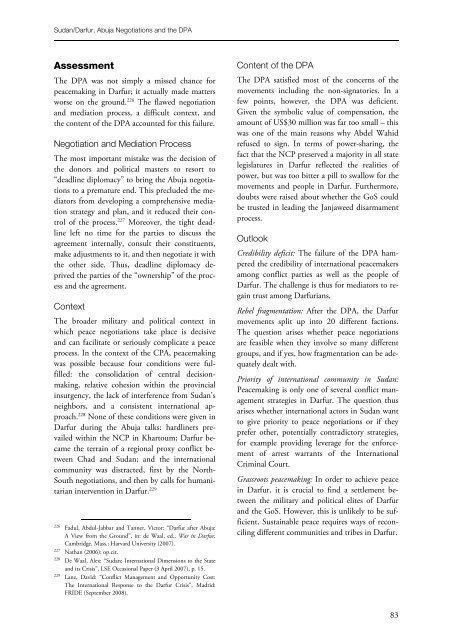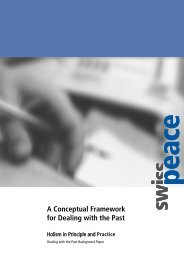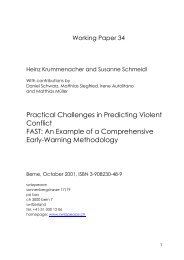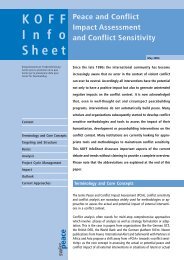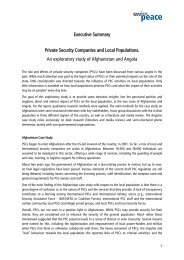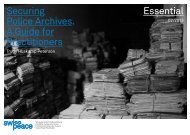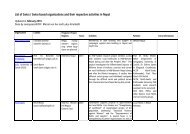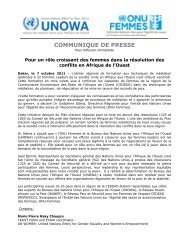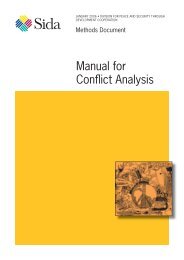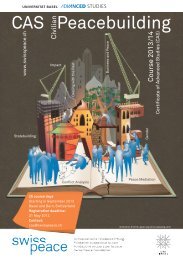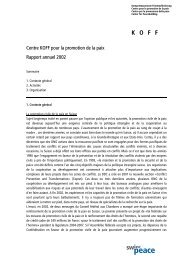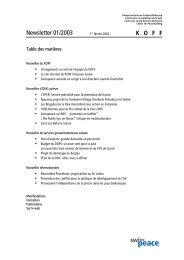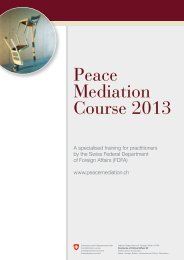Unpacking the Mystery of Mediation in African Peace ... - Swisspeace
Unpacking the Mystery of Mediation in African Peace ... - Swisspeace
Unpacking the Mystery of Mediation in African Peace ... - Swisspeace
You also want an ePaper? Increase the reach of your titles
YUMPU automatically turns print PDFs into web optimized ePapers that Google loves.
Sudan/Darfur, Abuja Negotiations and <strong>the</strong> DPA<br />
Assessment<br />
The DPA was not simply a missed chance for<br />
peacemak<strong>in</strong>g <strong>in</strong> Darfur; it actually made matters<br />
worse on <strong>the</strong> ground. 226 The flawed negotiation<br />
and mediation process, a difficult context, and<br />
<strong>the</strong> content <strong>of</strong> <strong>the</strong> DPA accounted for this failure.<br />
Negotiation and <strong>Mediation</strong> Process<br />
The most important mistake was <strong>the</strong> decision <strong>of</strong><br />
<strong>the</strong> donors and political masters to resort to<br />
“deadl<strong>in</strong>e diplomacy” to br<strong>in</strong>g <strong>the</strong> Abuja negotiations<br />
to a premature end. This precluded <strong>the</strong> mediators<br />
from develop<strong>in</strong>g a comprehensive mediation<br />
strategy and plan, and it reduced <strong>the</strong>ir control<br />
<strong>of</strong> <strong>the</strong> process. 227 Moreover, <strong>the</strong> tight deadl<strong>in</strong>e<br />
left no time for <strong>the</strong> parties to discuss <strong>the</strong><br />
agreement <strong>in</strong>ternally, consult <strong>the</strong>ir constituents,<br />
make adjustments to it, and <strong>the</strong>n negotiate it with<br />
<strong>the</strong> o<strong>the</strong>r side. Thus, deadl<strong>in</strong>e diplomacy deprived<br />
<strong>the</strong> parties <strong>of</strong> <strong>the</strong> “ownership” <strong>of</strong> <strong>the</strong> process<br />
and <strong>the</strong> agreement.<br />
Context<br />
The broader military and political context <strong>in</strong><br />
which peace negotiations take place is decisive<br />
and can facilitate or seriously complicate a peace<br />
process. In <strong>the</strong> context <strong>of</strong> <strong>the</strong> CPA, peacemak<strong>in</strong>g<br />
was possible because four conditions were fulfilled:<br />
<strong>the</strong> consolidation <strong>of</strong> central decisionmak<strong>in</strong>g,<br />
relative cohesion with<strong>in</strong> <strong>the</strong> prov<strong>in</strong>cial<br />
<strong>in</strong>surgency, <strong>the</strong> lack <strong>of</strong> <strong>in</strong>terference from Sudan’s<br />
neighbors, and a consistent <strong>in</strong>ternational approach.<br />
228 None <strong>of</strong> <strong>the</strong>se conditions were given <strong>in</strong><br />
Darfur dur<strong>in</strong>g <strong>the</strong> Abuja talks: hardl<strong>in</strong>ers prevailed<br />
with<strong>in</strong> <strong>the</strong> NCP <strong>in</strong> Khartoum; Darfur became<br />
<strong>the</strong> terra<strong>in</strong> <strong>of</strong> a regional proxy conflict between<br />
Chad and Sudan; and <strong>the</strong> <strong>in</strong>ternational<br />
community was distracted, first by <strong>the</strong> North-<br />
South negotiations, and <strong>the</strong>n by calls for humanitarian<br />
<strong>in</strong>tervention <strong>in</strong> Darfur. 229<br />
226 Fadul, Abdul-Jabbar and Tanner, Victor: “Darfur after Abuja:<br />
A View from <strong>the</strong> Ground”, <strong>in</strong>: de Waal, ed., War <strong>in</strong> Darfur,<br />
Cambridge, Mass.: Harvard University (2007).<br />
227 Nathan (2006): op.cit.<br />
228 De Waal, Alex: “Sudan: International Dimensions to <strong>the</strong> State<br />
and its Crisis”, LSE Occasional Paper (3 April 2007), p. 15.<br />
229 Lanz, David: “Conflict Management and Opportunity Cost:<br />
The International Response to <strong>the</strong> Darfur Crisis”, Madrid:<br />
FRIDE (September 2008).<br />
Content <strong>of</strong> <strong>the</strong> DPA<br />
The DPA satisfied most <strong>of</strong> <strong>the</strong> concerns <strong>of</strong> <strong>the</strong><br />
movements <strong>in</strong>clud<strong>in</strong>g <strong>the</strong> non-signatories. In a<br />
few po<strong>in</strong>ts, however, <strong>the</strong> DPA was deficient.<br />
Given <strong>the</strong> symbolic value <strong>of</strong> compensation, <strong>the</strong><br />
amount <strong>of</strong> US$30 million was far too small – this<br />
was one <strong>of</strong> <strong>the</strong> ma<strong>in</strong> reasons why Abdel Wahid<br />
refused to sign. In terms <strong>of</strong> power-shar<strong>in</strong>g, <strong>the</strong><br />
fact that <strong>the</strong> NCP preserved a majority <strong>in</strong> all state<br />
legislatures <strong>in</strong> Darfur reflected <strong>the</strong> realities <strong>of</strong><br />
power, but was too bitter a pill to swallow for <strong>the</strong><br />
movements and people <strong>in</strong> Darfur. Fur<strong>the</strong>rmore,<br />
doubts were raised about whe<strong>the</strong>r <strong>the</strong> GoS could<br />
be trusted <strong>in</strong> lead<strong>in</strong>g <strong>the</strong> Janjaweed disarmament<br />
process.<br />
Outlook<br />
Credibility deficit: The failure <strong>of</strong> <strong>the</strong> DPA hampered<br />
<strong>the</strong> credibility <strong>of</strong> <strong>in</strong>ternational peacemakers<br />
among conflict parties as well as <strong>the</strong> people <strong>of</strong><br />
Darfur. The challenge is thus for mediators to rega<strong>in</strong><br />
trust among Darfurians.<br />
Rebel fragmentation: After <strong>the</strong> DPA, <strong>the</strong> Darfur<br />
movements split up <strong>in</strong>to 20 different factions.<br />
The question arises whe<strong>the</strong>r peace negotiations<br />
are feasible when <strong>the</strong>y <strong>in</strong>volve so many different<br />
groups, and if yes, how fragmentation can be adequately<br />
dealt with.<br />
Priority <strong>of</strong> <strong>in</strong>ternational community <strong>in</strong> Sudan:<br />
<strong>Peace</strong>mak<strong>in</strong>g is only one <strong>of</strong> several conflict management<br />
strategies <strong>in</strong> Darfur. The question thus<br />
arises whe<strong>the</strong>r <strong>in</strong>ternational actors <strong>in</strong> Sudan want<br />
to give priority to peace negotiations or if <strong>the</strong>y<br />
prefer o<strong>the</strong>r, potentially contradictory strategies,<br />
for example provid<strong>in</strong>g leverage for <strong>the</strong> enforcement<br />
<strong>of</strong> arrest warrants <strong>of</strong> <strong>the</strong> International<br />
Crim<strong>in</strong>al Court.<br />
Grassroots peacemak<strong>in</strong>g: In order to achieve peace<br />
<strong>in</strong> Darfur, it is crucial to f<strong>in</strong>d a settlement between<br />
<strong>the</strong> military and political elites <strong>of</strong> Darfur<br />
and <strong>the</strong> GoS. However, this is unlikely to be sufficient.<br />
Susta<strong>in</strong>able peace requires ways <strong>of</strong> reconcil<strong>in</strong>g<br />
different communities and tribes <strong>in</strong> Darfur.<br />
83


